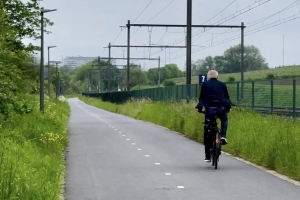Formal Transport Council: The Belgian Presidency presents the Brussels Memorandum to the EU Commission
The EU Transport and Mobility Ministers gathered under the Belgian Presidency this Tuesday, June 18, in Luxembourg. The Council adopted a set of positions (general approaches) aimed at a more European and efficient management of existing rail capacity (Rail Capacity Initiative), as well as on inland waterways. The Member States also adopted conclusions to improve road safety, with special attention to active and vulnerable road users. In addition, at the initiative of the Belgian Presidency, the ministers discussed the political priorities of the next European Commission. Finally, the Deputy Prime Minister and Minister of Mobility of the Belgian Federal Government presented the "Brussels Memorandum" to the European Commission: a document compiling the recommendations of the Belgian Presidency, drawn up on the basis of work carried out since January, on future policies aiming to make mobility greener, fairer, safer, and more resilient.

Georges Gilkinet, Deputy Prime Minister and Minister of Mobility of the Belgian Federal Government: "Currently, transport remains one of the largest contributors to carbon emission, responsible for nearly a quarter of the EU's greenhouse gas emissions. Mobility thus plays a key role in the green and just transition of our economies, and more broadly, our societies. The Belgian Presidency is convinced of this pivotal role and has succeeded in bringing essential mobility themes on the agenda. Whether we speak of deploying active mobility like walking and cycling, strengthening rail connections for both day and night travel, redirecting our travel modes, particularly aviation, towards a more sustainable path, or ensuring better working conditions and fairer competition in the transport sector. The next Commission will have to address these issues if it intends meeting the EU's climate goals and work towards a prosperous, better-connected, fairer, and more resilient Europe in the face of today's challenges.
At the crossroads of two European legislative terms, the Belgian Presidency of the EU Transport Council had a dual ambition: on the one hand, to forge agreements on the legislative files under discussion within the Council[1] and in Trilogues with the Commission and the European Parliament[2]; and on the other hand, to shape the future of European mobility to make it greener, fairer, safer, and more resilient.
This Tuesday, June 18, the Council provided an opportunity for the Transport and Mobility Ministers to exchange views on the political priorities of the next European Commission. How to decarbonize mobility and promote the shift towards least polluting modes of transport for goods and passengers, i.e.: rail transport and cycling? How to make our mobility greener, fairer, more efficient, and safer? How to ensure funding in transport infrastructure to make it more sustainable and resilient? These were the key issues discussed this Tuesday in Luxembourg, essential for shaping the mobility of the future.
A common outline for the future of European Mobility
Following the formal TTE Council, the Belgian Presidency, embodied by Deputy Prime Minister and Federal Minister of Mobility Georges Gilkinet, presented the Brussels Memorandum to the European Commission. This strategic document is intended to serve as roadmap for the next European Commission's policies on mobility. It includes:
·The Brussels Declaration
Signed early April at the informal Transport Council, the Brussels Declaration calls on the Commission to take concrete and decisive measures to promote the most ecological modes of transport, as they are essential pillars for decarbonizing our mobility. For short journeys, active mobility such as cycling should be developed, and for longer trips or freight transport, rail should be made the backbone of mobility in Europe. The Brussels Declaration makes twenty specific recommendations in this regard.
·Policy recommendations
Drafted under Belgian Presidency, these recommendations cover, among other things:
- Developing rail freight, recognized as a key element in decarbonizing our transport, for which it is necessary to advance towards harmonized policies, greater coordination and synergies, while continuing necessary investments in infrastructure.
- Strengthening and coordinating road controls, to improve working conditions for drivers while enhancing road safety for all users and fighting social dumping in the road transport sector.
- The greening of aviation, to reduce the environment impact of air transport while ensuring better social standards for workers and ensuring a level playing field with other transport modes.
- The structuring of autonomous mobility, and the development of a stable regulatory framework that will enable the development of sustainable, affordable, inclusive autonomous mobility solutions that support multimodality and road safety.
- Promoting cycling, and the best strategies to make it a fully-fledged mode of transport across the EU, following the commitments made through the first inter-institutional declaration on cycling, signed last April alongside the informal Transport Council.
“At a time when the tangible consequences of global warming are hitting European countries hard, when major cities are suffocating and paralyzed by traffic jams, and when it is crucial to create and consolidate tomorrow's jobs in Europe: it is vital to redirect our mobility towards more sustainable modes of transport. For our planet, for our economy, and for our health. That is why we call on the next Commission to adopt ambitious mobility programs. This is how the EU can pave the way for a just ecological transition and address the major challenges facing our continent,” concludes Minister Gilkinet.
The Brussels Memorandum is available here.
[1] The Council notably established its position this Tuesday on the "Rail Capacity Initiative," a text aimed at enhancing the efficiency of managing existing rail capacity, as well as on conclusions regarding road safety, calling on the Commission and Member States to intensify their efforts in this area in order to achieve the goal of halving the number of deaths and serious injuries on European roads by 2030.
[2] The finalization of the new TEN-T regulation to strengthen the resilience and sustainability of our transport networks in Europe, the revision of the Single European Sky (SES2+) to make aviation safer and more sustainable, and the revision of the Cross-Border Enforcement Directive to end the impunity of foreign drivers have notably been achieved.


